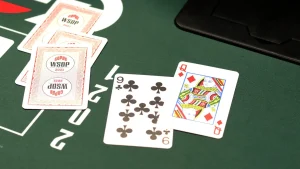Many programs designed to assist those suffering from poker addiction rely on them swearing off gambling entirely – however this approach can be patronizing and ineffective as many have tried this before and failed miserably.
Poker, like other forms of gambling, combines both excitement and frustration when winning or losing. It can become an inescapable psychological trap which is difficult to escape.
Symptoms of Addiction
Addiction can produce many physical and psychological side-effects for those suffering. They may lose control of their finances, fail to fulfill school or work responsibilities, become depressed or anxious and even risk their family, property or career as a result of addiction.
Addiction is often associated with substance abuse, but behavioral addictions like gambling can also be harmful. Recognizing warning signs of gambling addiction in yourself or loved ones is important so they can seek professional assistance immediately.
Poker can be an addictive form of gambling because it mixes skill with chance. As such, its outcome lies outside a player’s direct control, so the thrill of winning and frustration of losing can quickly become addictive – especially with online games that can be completed within minutes – creating temptation. However, poker addiction is treatable and individuals can find freedom from it; all it requires is understanding why gambling brings pleasure for each person involved.
Signs of Depression
Poker is a game of skill and luck that can quickly turn into addiction when players experience both positive and negative emotions on an almost continual basis. This is particularly true online where gamers can access the games at any time of day or night. Some individuals become depressed due to gambling addiction; it can be very difficult to quit this habit on its own. If a friend of yours has become depressed due to gambling addiction, try speaking to them about it; express your concerns over their behavior while encouraging them to seek treatment options.
Gambling addiction may lead to high rates of suicide and financial instability; yet it’s possible for those struggling with gambling to overcome it through psychological therapy. Through cognitive behavioral therapy and motivational interviewing techniques they may overcome any fears about giving up gambling.
Signs of Anxiety
Gambling can be an engaging yet addictive pastime that combines skill with chance, creating an alluring illusion that winning or losing is solely under their control – leading them down a dangerous and addictive path towards addiction.
As soon as a player’s gambling problem becomes severe, they may experience numerous symptoms including financial instability, debt and the loss of property. Gambling addiction may even lead to bankruptcy and divorce proceedings in extreme cases; furthermore, gamblers often spend more time at the table and prefer higher stakes games which increases their risk for addiction.
Problem and compulsive poker gamblers can break free of their gambling addiction without it becoming complex or costly, and in just an hour. Treatment methods require addicts to acknowledge their addiction before dedicating themselves to fighting it for the rest of their lives – something which doesn’t happen easily with this method.
Signs of Withdrawal
Problem gamblers and compulsive poker players may vow to stop gambling time after time, yet are often unable to. Breaking this addiction can be especially hard in online poker where play can move so rapidly.
One hand can take as little as 40 seconds to play on an online poker site, making it easy for those starting out to quickly develop an addiction to this fast-paced and risky game.
At first sight, witnessing someone you care for suffer from an addiction can be emotionally heartbreaking and strain the relationship. You can help by not enabling their behavior: remove yourself from any joint credit cards and limit their access to funds; also encourage them to build support systems and participate in activities which relieve stress; if withdrawal symptoms appear remember these are normal and should last only temporarily.




